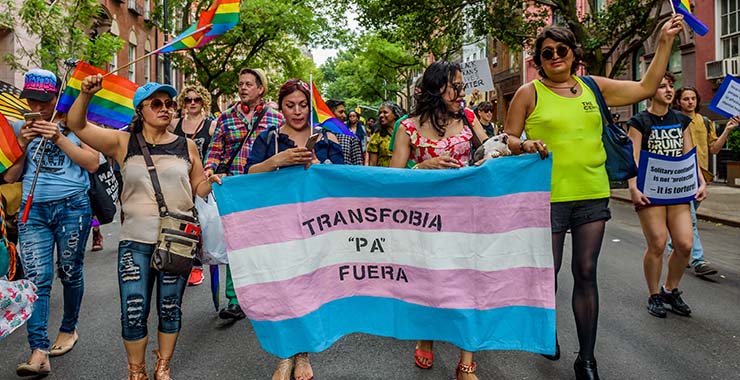Although psychological research has often focused on the distress experienced by Latinx transgender and non-binary persons, recent studies have begun to highlight their own forms of empowerment, healing, growth, and joy.
In a recent article published in the Journal of Counseling Psychology, Álvaro Gamio Cuervo and their colleagues at the University of Massachusetts Boston aimed to develop new theories about how diasporic Latinx transgender and non-binary individuals heal after experiencing rejection from their families:
“We offer two contributions to the conceptualization of the healing process individuals may undergo after experiencing family rejection. First, diasporic identity formation after experiences of rejection is facilitated through the reconstruction of familial relationships and cultural healing. Second, chosen family and supportive community networks may adopt the responsibility of [ethnic-racial socialization] after proximity to family of origin is lost.”
 Individuals who identify as transgender or nonbinary often experience various forms of discrimination, violence, and oppression. These negative experiences can cause minority stress, which increases their likelihood of developing depression, anxiety, and schizophrenia.
Individuals who identify as transgender or nonbinary often experience various forms of discrimination, violence, and oppression. These negative experiences can cause minority stress, which increases their likelihood of developing depression, anxiety, and schizophrenia.
Research has shown that while minority stress plays a part in the higher rates of schizophrenia among transgender people, clinicians’ bias against them also contributes to increased diagnoses of psychotic disorders, borderline personality disorder, and other psychiatric illnesses. Although transgender identity and experience are no longer considered a mental disorder, psychiatric research still uses outdated diagnostic labels and stigmatizing language, and practitioners continue to hold harmful biases towards this community. Furthermore, studies have found that psychiatric residents often lack cultural competency due to inadequate training, which can lead to malpractice and harmful practices like gender identity conversion efforts.
There are numerous ways to promote the well-being of transgender and nonbinary individuals and enhance their treatment. Research indicates that using a person’s preferred name can lower depression and suicidal tendencies while gender-affirming measures can alleviate mental health issues.
From a public health perspective, countries with high levels of acceptance towards LGBTQ individuals and states with hate crime laws have lower rates of suicide. In contrast, teenagers living in conservative areas experience greater psychological distress. Psychodynamic therapy has shown effectiveness in helping LGBTQ individuals cope with minority stress. However, there is a lack of research on the experiences of gender-diverse Latinx individuals despite extensive research on the factors affecting the lives of transgender and nonbinary people in general.
Gamino Cuervo conducted a study to understand how family rejection affects Latinx transgender and nonbinary individuals and how they cope. The research team interviewed twelve participants who identified as Latinx and, transgender, nonbinary, and agender. Their ages ranged from 23-32, and most identified as mixed race. The interviews were conducted in English or Spanish and lasted 60 to 120 minutes. The analysis of the interviews resulted in the identification of three clusters of data composed of smaller categories of data. A core category was developed through the critical-constructivist grounded theory analytic process. The study aimed to identify behaviors and resources that influenced resilience in these individuals.
Cluster 1: Recreation of the family system.
Many participants found that the beginning of their healing process involved creating a new family system that accepted and affirmed their gender, race, and ethnicity. Others were able to transform their existing family system to challenge traditional gender norms and promote acceptance, which aligned with the Latinx value of familismo, or loyalty to family. Unfortunately, not all participants experienced positive changes with their family of origin, leading some to feel a mix of grief and hope.
According to the researchers:
“Grieving from family rejection was an ongoing process of loss that was accompanied by unresolved closure due to the inability to access emotional resolution with rejecting family members. Participants tended to grasp onto hope that family would accept them, and this hope took on an intrinsic function for each participant. For some, the hope delayed taking space from abusive family, while for others, the hope facilitated a relationship with parents despite rejection. Many participants acknowledged family rejection as permanently solidified once they were able to identify a pattern of violence that was intertwined with ongoing rejecting actions.”
As part of the healing process, the participants regained control over their own lives and rejected the obligation to heal from their family rejection and unhealthy coping mechanisms. Additionally, they formed close relationships with chosen family members who offered unwavering love, emotional support, and other resources essential for overcoming family rejection.
Cluster 2: “Creating a new way” – Community-based cultural healing.
Many participants acknowledged their need for cultural healing after recognizing their fear of rejection and experiencing the disconnection from their culture after rejection. This cultural healing was promoted by cultivating “trans-affirming racial-ethnic identity and community.” For example, participants mentioned worrying about and foreseeing further rejection from extended family and larger communities, which led to isolation and anguish. Some participants also described how they lived through cultural loss, as parents hesitated to discuss their ancestry. To heal from this disconnection, participants found personal ways to reconnect with their ancestors and lineage. They affirmed themselves in their emerging sense of ethnic and cultural identities that were also trans-affirming.
Cluster 3: Autonomy in trans identity and psychological well-being.
Confidence in their autonomy as transgender and nonbinary people and autonomy regarding their well-being was another element in their healing process. This often included tackling the effects of rejection, engaging in psychotherapy, and arranging their own process of transitioning. This led to living more authentically while improving their psychological strengths. Among the effects of rejection, participants mentioned the internalization of anti-trans messages heard throughout their lives (at times directed at them), the generalization of mistrusting others (often related to their inability to trust their families of origins), and other issues.
To heal, participants talked about the importance of trauma-informed and culturally- responsive treatment that was characterized by their therapists’ compassion and empathy, understanding of the role of family rejection, violence, transphobia, and cultural loss in their suffering, their awareness regarding transgender and Latinx issues, and their openness to learning more from the participants. Psychotherapy with these qualities allowed the participants to work through and partially heal their experiences of family rejection.
Moreover, participants mentioned how being able to transition without the presence of family was a part of the healing process, particularly from internalized rejection and gendered racism (e.g., the internalization of Eurocentric standards of beauty and gender expression). By confronting their own internalized transphobia and racism, they could navigate these experiences without their family’s influence. Finally, participants found autonomy by living through and overcoming some of the impact of stigma related to family rejection and being able to create community and intimate relationships.
Core Category: Recreating diasporic identity and community.
The core category developed in grounded theory studies aims to summarize and encapsulate the essence of the phenomenon or process being studied. According to the authors, healing from family rejection leads Latinx transgender and nonbinary individuals to recreate a diasporic identity and community while learning to live authentically in their own racial-ethnic and gendered expression.
This study offers a new theory on the healing process for Latinx transgender and nonbinary individuals who have experienced familial rejection. The theory is grounded in cultural considerations and can inform the development of new healing practices, including those that are familial, communal, individual, or within psychotherapeutic practices.
Healthcare practitioners can benefit from adopting this knowledge and fostering these strategies within their clinical or counseling practices, providing more personalized and culturally sensitive treatment for their patients and their families. The study also highlights the resilience and empowerment of transgender individuals rather than viewing them as passive victims or subjects of psychopathology, which has been the focus of past research.
****
Gamio Cuervo, Á., Herrawi, F., Horne, S. G., & Wilkins-Yel, K. G. (2023). Recreating diasporic identity and community: Examination of transgender and nonbinary Latinx healing from family rejection. Journal of Counseling Psychology, 70(5), 535–547. https://doi.org/10.1037/cou0000692 (Link)















Who is this guy “bradford hutchinson”? He sounds schizophrenic. Or bi-polar. Or maybe he has “BPD”, you know, Borderline Personality Disorder. People like him should be psychiatrized, and forced drugged with neurotoxic psych drugs. For the good of the community. He’s dangerous.
Even his very words must be censored, so that he doesn’t infect the fragile snowflaked egos of the rainbow mafia. Clearly, he must be mad in America. Or something. Who knows? Who cares? Someday, we are all going to die, anyway, so what’s your hurry, Bub?….
Report comment